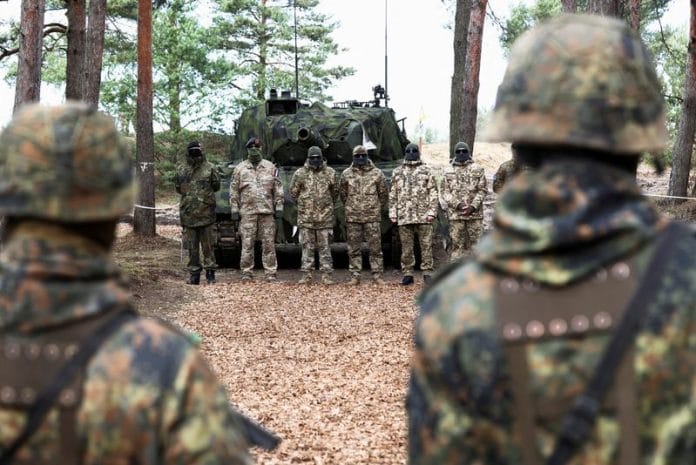By Andrew Gray
BRUSSELS (Reuters) -The European Union should move military trainers into Ukraine after the war there ends to strengthen Ukrainian forces as part of Western security guarantees, the EU’s top military adviser told Reuters.
General Sean Clancy, chair of the EU’s military committee, said the United States would remain important for Europe’s security even as the EU gears up to be ready to defend itself by 2030.
NATO will continue to provide “hard power” to defend Europe but the transatlantic relationship will be rebalanced with Europeans becoming more self-reliant, said Clancy, who is Irish.
HAVING EU TRAINERS IN UKRAINE AFTER WAR IS ‘OPTIMAL’
The EU’s defence push has been driven by Russia’s 2022 invasion of Ukraine and U.S. President Donald Trump’s demands for Europeans to take more responsibility for their own security.
With the war in Ukraine showing no sign of ending, Western officials have been developing post-war plans to bolster Kyiv’s forces and deter Russia from attacking its neighbour again.
Clancy said it would be “optimal” to move part of the EU Military Assistance Mission in support of Ukraine (EUMAM Ukraine) into the country after the war. The mission has already trained more than 80,000 soldiers outside Ukraine.
Clancy said strong Ukrainian forces would serve as a security guarantee for both Ukraine and Europe.
“Europe can provide a high degree of that level of training. Will some of that be in Ukraine? I think that is optimal,” he said.
EU foreign policy chief Kaja Kallas said in September there was broad support from EU countries to take such a step, but no decision has been made yet. It would likely depend on the terms of any ceasefire or peace deal, diplomats say, and would need the backing of all 27 EU member states.
SIZE OF MISSION WOULD DEPEND ON REQUIREMENTS
Clancy said the size of any EU presence inside Ukraine would depend on what Kyiv wanted and the type of training required.
“This is something that we are…prudently examining in concert with our colleagues in Ukraine. And their needs are changing as well,” he said.
As chair of the EU military committee, Clancy serves as the voice of the military chiefs of the bloc’s member countries in discussions on defence and security policy.
That has included providing advice for the European Commission’s “Defence Readiness Roadmap”, which aims to prepare Europe to “credibly deter its adversaries and respond to any aggression” by 2030.
But Clancy said the U.S.-European security relationship would remain important, not least because Europeans would still be using U.S. weapons systems, even while striving to expand their own defence industries.
“For Patriot missiles, for F-35s (fighter jets) – all of the equipment and the high-end equipment that we already have sourced in the United States has a lifetime of decades to come,” he said.
(Editing by Timothy Heritage)
Disclaimer: This report is auto generated from the Reuters news service. ThePrint holds no responsibility for its content.






